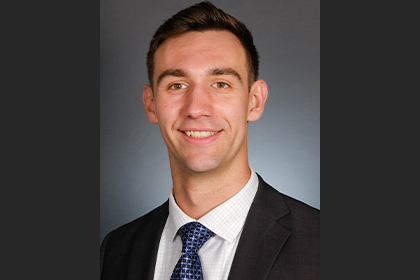An analysis by UVM medical student Benjamin Weaver and UVM Cancer Center member and Assistant Professor of Radiation Oncology Nataniel Lester-Coll, M.D., illustrated both health disparities and parities across a cohort of 100,000+ patients with the most common form of liver cancer. Their results were published in the Journal of Vascular and Interventional Radiology.

Ben Weaver, Larner College of Medicine Class of 2023 medical student
Analysis by University of Vermont Cancer Center researchers illustrate both health disparities and parities across a cohort of 100,000+ patients.
Curious about whether insurance plans influenced liver cancer patient health outcomes, University of Vermont Larner College of Medicine medical student Benjamin Weaver and University of Vermont Cancer Center member, Nataniel Lester-Coll, M.D., studied a cohort of 105,703 patients with early-stage hepatocellular carcinoma (HCC) – the most common type of liver cancer. Using the National Cancer Database (NCDB), their analysis retro-actively examined how a patient’s primary insurance was associated the treatments they received for a potentially curable cancer.
It should be noted that it is not common for a physician to consider a patient’s insurance in treatment decisions. However, research in other tumor types (e.g. breast, colon, and lung cancer) suggests a precedent for disparities. Until now, no such analysis was available for liver cancer.
Amongst the significant findings, the team identified that a large majority of patients with early-stage HCC do not receive any form of procedural therapy, which is the only way an HCC patient can be completely cured of the disease. In addition, data showed that patients with private insurance were more likely to receive a liver transplant, which is currently the treatment option with the most favorable long-term outcomes. Patients with Medicaid and no insurance were the least likely to receive any procedural therapy for their cancer, suggesting health disparities based on socioeconomic status.
However, perhaps the most interesting takeaway from the analysis, is that rates of ablation, a minimally invasive radiological procedure, were similar across insurance carriers. In select patients (typically when the cancer is caught very early), this treatment can be completely curative.
The results, published in the Journal of Vascular and Interventional Radiology, show disparities in access to the best therapies based on insurance status, except for ablative therapies. To improve patient outcomes in the future, the team will return to the database to better understand what factors influence early-stage HCC patients’ refusal of procedural therapy, including ablation, resection, and transplant, and to develop potential interventions based on the data.